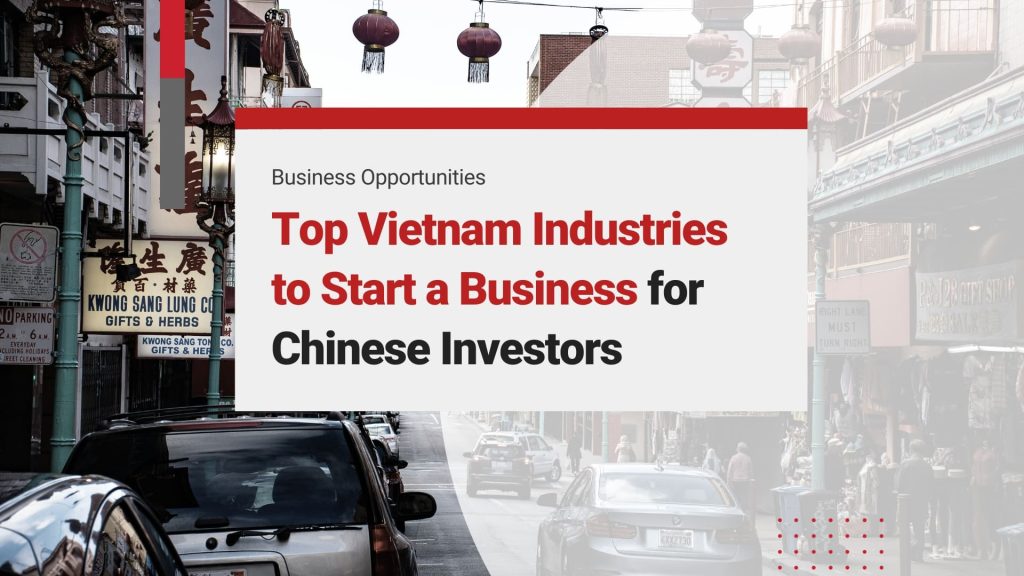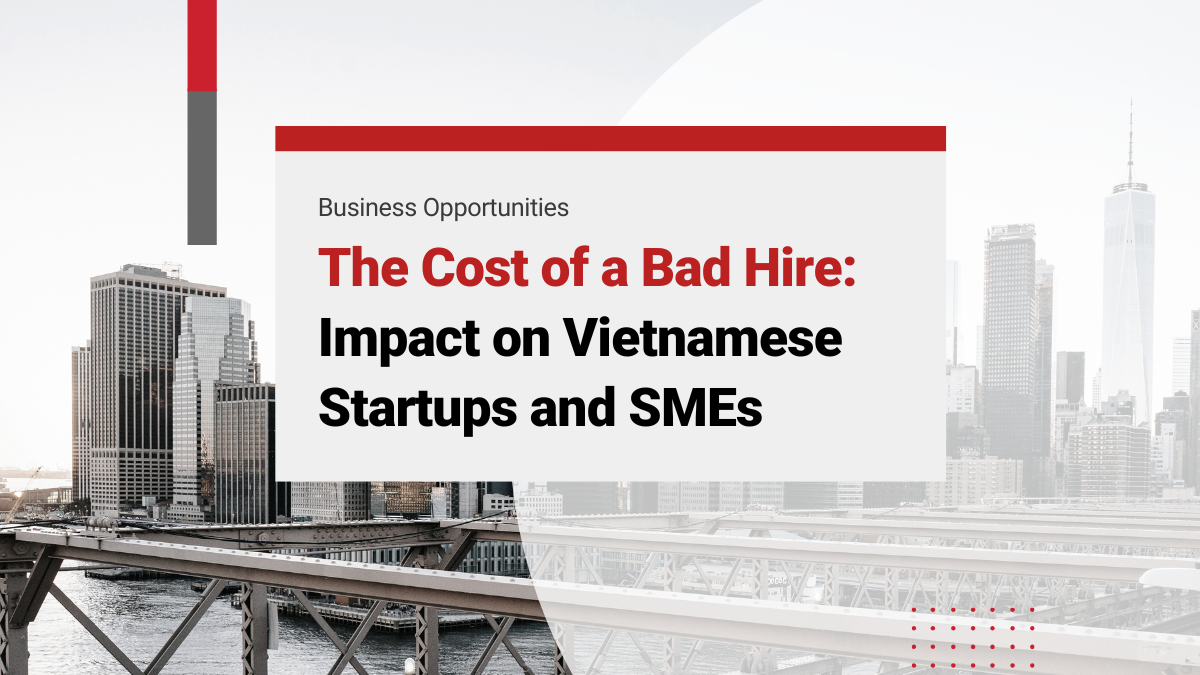Vietnam has emerged as a prime destination for Chinese investors seeking profitable ventures within Southeast Asia. Vietnam’s business opportunities make it an appealing destination for foreign investment. In particular, Chinese investors collaborating across industries strengthen bilateral ties, the post-US-China Trade War, positively impacting both nations’ economies. Therefore, this article explores sectors attracting Chinese investors in Vietnam, showcasing the mutually beneficial economic relationship between the two nations.
Many entrepreneurs are also establishing companies in Vietnam to take advantage of its growing cross-border trade and investor-friendly environment.
Overview of Chinese Investments in Vietnam
Between 2015 and 2022, Chinese investments in Vietnam displayed an impressive upward trajectory, with an average annual growth rate of 17%. Despite strict lockdowns, growth continued, supported by ventures from China, Taiwan, and Hong Kong, consistently enhancing production resources in Vietnam.
A statistical analysis by trade expert David Dollar, from the prestigious U.S. Brookings Institution, also unveils that China’s influence as a catalyst for Vietnamese exports is undeniable. Besides, in 2021, the same accounted for over 20% of the imports funneling into Vietnam’s export machinery. Notably, this constitutes nearly double the numbers witnessed in 2017.
Following the trajectory of Sino-Vietnamese trade relations are the foreign direct investment (FDI) patterns. Back in 2011, China held the 14th spot among 94 nations investing in Vietnam. By 2022, China had risen to the fourth spot, as highlighted by data from Vietnam’s Ministry of Planning and Investment.
In fact, the majority of Chinese investments in Vietnam now come from smaller companies. However, these smaller firms provide various supplies and services to bigger corporations that have already established their presence in Vietnam. This trend is especially noticeable in the northern regions, which are located just across the border. This shift towards smaller businesses is evident in the average amount of money that Chinese investors are putting into new projects in Vietnam. This year, the average investment from Chinese companies is about US$5.6 million, which is slightly lower than the typical long-term average of US$6.5 million.
Amid the global efforts to recover from the pandemic’s impact and the resultant decline in foreign investments within Vietnam, Chinese companies have demonstrated a remarkable trend. In the current year, they have substantially increased their investments in new construction projects within Vietnam, with an impressive surge to US$250 million. Official data reveals that this is a threefold increase when compared to the corresponding period from the previous year. Remarkably, this surge in Chinese investments places them in the second position in terms of investment volume, tailing only behind Singapore. Surpassing traditionally prominent investors like South Korea and Japan, China’s heightened involvement has had a burgeoning influence on the economic landscape of Vietnam.
As of January 20, 2023, the count of foreign-funded projects in Vietnam has continued to climb, solidifying China’s position as the sixth-largest investor in the nation. The cumulative investment from China has reached a substantial US$23.6 billion. Recent data from the Vietnamese government also reveals that during the initial 50 days of 2023, Chinese entities, in an unrivaled fashion, spearheaded a substantial influx of capital by initiating 45 novel ventures in Vietnam.
Despite the challenges posed by various factors, Chinese entities remain well-positioned to participate in the development of Vietnam’s transportation infrastructure. Vietnam has strategically allocated resources for the enhancement of its road network. The country has earmarked approximately US$17.06 billion for investments up to 2025, followed by an additional US$14 billion spanning the period from 2026 to 2030.
Read Related: Doing Business in Vietnam as a Chinese Investor: What, Where, Why and How?
Why Should the Chinese Invest in Vietnam?
Chinese enterprises are increasingly drawn to investing in Vietnam, driven by a multitude of compelling factors. Firstly, the close geographical proximity between China and Vietnam, facilitated by their shared border, offers seamless transportation of goods, raw materials, and production resources. Particularly in the Northern region of Vietnam, businesses enjoy the advantages of being geographically near China, along with cost-effective industrial land rentals that outperform those in the Southern region.
Secondly, Vietnam’s varied topography supports integrated economic zones, while its skilled workforce and competitive labor costs enhance its appeal. Thirdly, the Vietnamese government’s tax incentives further attract foreign investors.
Vietnam’s impressive level of economic integration stands out prominently. With established economic and trade ties extending to approximately 224 partners across the globe, the landscape is primed for Chinese businesses in Vietnam to harness advantageous opportunities and expand their market foothold. In a notable case spotlighted by the South China Morning Post, Strategic Sports, a prominent global helmet manufacturer, has unveiled plans to establish a state-of-the-art factory in Vietnam by 2024, entailing a significant investment of US$30 million. This strategic decision holds paramount importance for the company’s survival, driven by a confluence of geopolitical considerations.
Read More: Moving to Vietnam for Chinese Businesses: What are the Benefits?
Ten Insights about Vietnam from Chinese Media
1. Vietnam stands as a land of rich resources, untapped talent, and enticing incentives, creating a fertile ground for foreign investors. It is also a nation with an exceptional geographical position, a mild climate, and a welcoming investment atmosphere.
2. Positioned strategically, Vietnam acts as a gateway and strategic hotspot for one of the world’s most densely populated regions, comprising ASEAN nations, China, Japan, and South Korea.
3. The nation’s economic growth is directly proportional to its political stability and thus, attracts investors. In tandem with economic policies, the nation has also systematically fortified its technical infrastructure, ensuring unwavering quality across diverse regions.
4. In 2021, Vietnam swiftly rebounded from the grip of the pandemic, resuming full business activities and positioning itself as a frontrunner in diversifying global supply chains.
5. Additionally, Vietnam has displayed a dynamic approach to revamping investment regulations. The same is coupled with attractive incentives like corporate tax breaks, import duty exemptions for specific industries, and land rental waivers.
6. Vietnam has an investment-friendly environment marked by openness, transparency, and alignment with international norms. The country’s engagement in a series of trade agreements, both multilateral and bilateral, has propelled allured investors from developed nations.
7. Armed with competitive wage levels and robust skill sets, the Vietnamese workforce notably excels in various sectors, including technology, pharmaceuticals, and financial services, offering cost-effectiveness unparalleled in the region.
8. Vietnam also boasts a remarkable 2.7-fold growth in GDP per capita from 2002 to 2018.
9. Due to the legal framework for foreign investment, Vietnam enhances transparency and investor-friendly policies that foster profitability.
10. Vietnam’s “multilateralization and diversification” policy integrates it globally, boosting trade and investment. Better business conditions foster development chances.
Investing in Vietnam? Find out about InCorp’s Incorporation Services for Foreign Investors
Top Industries for Chinese Investors
Chinese enterprises are now displaying an increasing interest in establishing manufacturing facilities within Vietnam. These companies prioritize serving established corporate giants’ material and service needs in Vietnam. According to Yicai Global (May 2023), diverse Chinese sectors are strategically aligning to support major corporations’ operational ecosystems:
- Textiles;
- Optics; and
- Telecommunications.
Moreover, the bulk of Chinese FDI channeled into Vietnam is notably directed towards the manufacturing and processing sector, with a particular emphasis on labor-intensive industries. In addition, Chinese investors are also actively participating in diverse domains such as:
- Generation and dissemination of electricity, gas, and water;
- Ventures in air conditioning; and
- Real estate.
Such a multifaceted approach throws light on China’s dynamic engagement, across a range of sectors, within the Vietnamese economy.
Read Related: Top Business Ideas to Invest in Vietnam for Foreign Investors
Top Chinese Companies in Vietnam
Gongjin Electronics, a leading broadband equipment provider from Shenzhen, invested nearly 400 million Chinese yuan (about US$57.5 million) in two phases to build a factory in Vietnam. The third phase is to raise the annual value to 10B CNY (approx. US$1.4B), bolstering the position in Vietnam’s manufacturing.
Furthermore, DBG Technology, a notable electronics service provider based in Guangdong’s Huizhou, plans to elevate its Vietnamese branch to an overseas headquarters. The goal is to produce 40 million smartphones and electronic devices annually in three years, targeting an impressive annual export value of $4.5 billion.
Supply chain dynamics are driving companies at different stages to invest collaboratively in Vietnam. DBG’s partnership with Huaqin Technology and Lingyi iTech, creating an industrial park in Thai Nguyen Province, showcases this synergy and investment-driven interplay.
Also, recent Reuters reports reveal Xiamen Lithium Energy Storage Technology and Growatt New Energy’s plan to invest around $1 billion in Vietnam. Xiamen Lithium aims to invest $900 million in a large factory across 30 hectares with close collaboration with Vietnamese authorities and regulators.
Meanwhile, Growatt New Energy has leased an existing manufacturing facility in Vietnam, preparing to invest about $300 million for 15 hectares of industrial land. This step highlights Vietnam’s attractiveness for strategic investments as a new factory emerges.
Furthermore, on June 28, 2023, in Beijing, Vietnam’s Prime Minister Pham Minh Chinh met notable Chinese company leaders. These representatives expressed their eagerness to enhance their investments in Vietnam. The event included leaders from Texhong, Energy China, Runergy, TCL, and GOERTEK.
Thus, at this important assembly, the representatives commended Vietnam’s progress and their local business activities. They also keenly talked about expanding investments in energy, industrial parks, housing, seaports, autos, R&D, and supply chains.
Conclusion
Vietnam’s attractiveness as an investment hub for Chinese investors has grown. Due to strategic factors, the close geographical proximity supports seamless trade and collaboration. The government’s proactive stance, including tax incentives and regulatory enhancements, enhances the appeal for foreign investors.
China’s significant investments, especially in manufacturing, drive Vietnam’s economic growth. Leading Chinese corporations’ eagerness to expand investments indicates Vietnam’s dynamic development.
Additionally, Vietnam’s resilient economy and effective pandemic containment bolster its appeal. Its strategic location and business-friendly ecosystem promote integration into the global economy. The partnership with Chinese investors signifies mutual growth through combined resources, talent, and innovation. These investments propel Vietnam towards a prosperous future as a key player in the global economy.

clients worldwide

professional staff

incorporated entities in 10 years

compliance transactions yearly
Learn the Right Setup for Business
Expansion in the Vietnam
Frequently Asked Questions
How many countries has China invested in?
- China has invested in over 120 countries through various initiatives, most notably the Belt and Road Initiative (BRI). These investments span Asia, Africa, Europe, Latin America, and Oceania, covering sectors such as infrastructure, energy, and manufacturing.
How to find a Chinese investor?
- To find a Chinese investor, you can attend international trade fairs, investment summits, or business matchmaking events that attract Chinese investors. Engaging with professional networks such as chambers of commerce, investment promotion agencies, and industry associations in China can also be effective. Additionally, platforms like LinkedIn, investment forums, or working with consultants experienced in China-Vietnam business relations can help identify suitable investors. Conduct due diligence to ensure the investor’s credibility and alignment with your business goals.
What is the largest investment company in China?
- The largest investment company in China is China Investment Corporation (CIC), the country’s sovereign wealth fund. Established in 2007, CIC manages over $1 trillion in assets globally and is tasked with investing China’s foreign exchange reserves for long-term returns.






